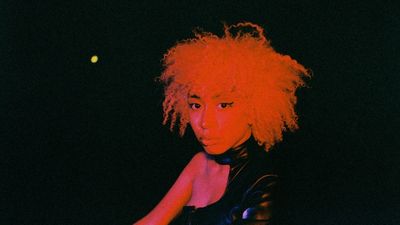Fousheé's Plan to Break Thru the Alt World Begins With 'Time Machine'
In an exclusive interview, Fousheé details her debut project time machine, growing up a lover of music, and why she hopes to be a voice in the alt world for Black women.
New Jersey’s emerging singer and multi-instrumentalist Fousheé has released her newest project time machine.
The self-described introvert has been sharpening her songwriting and music-making skills for years before her hook in Sleepy Hallows’ “Deep End (Freestyle)” began trending heavily on TikTok. time machine, her latest offering is a robust listening experience. The nine-track release leans heavily on experimentation and doesn’t align with one specific genre, instead, it’s genre-less.
Music has always been an integral part of Fousheé's life. Her mother who was a drummer in the Jamaican reggae band PEP before she moved to America to start a family is where her musical roots begin. Acts like Bob Marley, Etta James, and Toni Braxton were often heard in their home straight from her mother’s record collection. “I love artists who break the rules. I think growing up, I looked up to the usual suspects. Whoever was put in front of me,” she said over a Zoom call from her LA apartment.
“[My mom] played a lot of Bob Marley, and I think, unintentionally, just followed that blueprint of someone playing guitar and singing,” Foushee adds. “Really songwriting. Also, I was such a fan of music. When I was a kid, I would listen to the radio a lot.”

At six she wrote her first song and went on to perform with different girl groups created with childhood friends throughout her younger years. Foushee stayed consistent throughout her formative years and continued pursuing music even though she was a normal teen who later enrolled in college.
While in school she continued working on her craft and performed at local cafés. For years she cut her teeth as a performer in New York City. During this time period she was studying rock acts like Led Zeppelin while listening to a lot of jazz.
“I really gravitated towards people like Frank Ocean, who just put against the grain of what everyone else was doing, and was so introspective, and so anti-industry. Frank really inspired me a lot.”
Fast forward to 2019, she decided to move to LA to further explore life as a full-time artist and take her budding career to the next stage. This move was for the best as it immersed her in the creative community there. By 2020 she went viral, something that seemingly came out of the blue. She also signed to RCA that same year and things began picking up speed from this point on.

time machine is a culmination of her experiences with fame and also being an introvert in an industry that seems to never rest. “With this project, I wanted to create a lane for [myself] in alt music. I feel like most of the songs are very alt-leaning,” she said. “I wanted to talk about whatever I was dealing with, past, present, and future plans.”
One standout track featuring Lil Yachty, “clap for him” was a product of her having a great night in the studio. “It was just a very fun energy in the studio that night. I think that's the same night I made ‘Slime.’ He’s one of my favorite rappers right now,” she said on the process behind the energetic song. She adds she slid in Yachty’s DMs to let him know she was interested in working with him.
As for the title track “Time Machine,” Fousheé says it speaks on her transitioning and stepping into the success that came after “Deep End” blew up. “I felt a lot of pressure. I'm such an introvert,” she said. “Part of me is also a perfectionist, so I want it to be perfect, and not knowing what to do and how to handle all this newfound attention and trying to figure out what my role is now. ”
The killer closer “candy grapes” featuring multi-instrumentalist Steve Lacy was the product of a jam session. Fousheé mentions she loves working with Lacy and that the duo worked on five songs together during that specific session in which Lacy jumped from the piano to the guitar.
The rising talent is hoping to leave a mark on the industry, specifically as a Black woman creating alt music. “I want to take up more space in the alt world because I didn't realize there was such a lack of representation in the forefront in that genre,” she said. “I feel like there are other Black women, but maybe we’re just being mistitled, lost in translation. That was my goal with this project and I wanted it to be an introduction to what music for me is going to feel like. I don’t have only one sound.”

